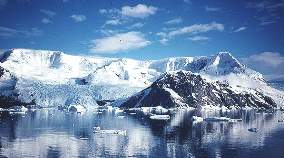|
Antarctica losing 190 million tonnes of ice per day
by Ben Cubby via sal - The Age (Melbourne) Monday, Oct 22 2012, 2:34am
international /
prose /
post
Antarctica is shedding an average of 190 million tonnes of ice every day, according to a landmark study that used satellites to "weigh" the vast land mass.

Although parts of east Antarctica are growing, glaciers in west Antarctica are melting faster, leading to a net loss of ice across the continent, according to the study published in the journal Nature.
"We're confident that the ice cover is shrinking, and the rate along the Amundsen Sea coast is accelerating," said the lead researcher, Professor Matt King, of the University of Tasmania.
Rapid melting in some parts of the continent is partially offset by heavy snowfalls elsewhere, meaning that the net loss of ice each year is about 69 billion tonnes.
Previous studies struggled to accurately map the land mass under most of Antarctica's huge ice shelves, and this knowledge is crucial to measuring the thickness of the ice.
As more ice melts, the land mass itself is gradually rising at a rate of about two millimetres a year, like a cake slowly baking in an oven.
"It's like if you're standing on a beach with some wet sand, and you move your foot and the print disappears pretty quickly, it just flows back into place," Professor King said.
A new analytical model was able to make satellite data match the ground-based observations about ice melt and land rise and it revised down the speed that the land was rising. The study made unique use of satellite data, from a project known as GRACE, short for Gravity Recovery and Climate Experiment. Twin satellites orbit the Earth, 220 kilometres apart and about 500 kilometres above the ground.
As they spin, tiny changes in the mass of the Earth affect their position in relation to each other. They carry instruments sensitive enough to measure a change in distance of about 10 micrometres – about one-tenth the width of a human hair.
Coupled with global positioning systems, the satellites can send back highly detailed information about Earth's gravity and therefore its land mass, even when the planet's surface is hidden deep beneath the ice.
One result of the findings is that melting ice in Antarctica is not contributing as much to a rise in global sea levels as some other studies have assumed.
While the continent contains enough frozen water to raise global sea levels by 59 metres should it ever all melt, the findings show it is currently contributing less than a millimetre a year.
Professor King said the findings showed that sea levels had already been rising faster than they had for centuries without much extra water from the Antarctic ice sheet.
"The melt in some key areas is sped up between 2006 and 2010, when the study ended," he said. "So it shows that sea level rise can be expected to change quite sharply if the melt rate continues to increase, on top of what's already happening."
© 2012 Fairfax Media
Please note, the original title and text have been altered by Fairfax media since we initially re-posted this piece; as a matter of integrity and respect for the author, this site will maintain the original text.
http://tinyurl.com/8cp2bl6
<< back to stories
|